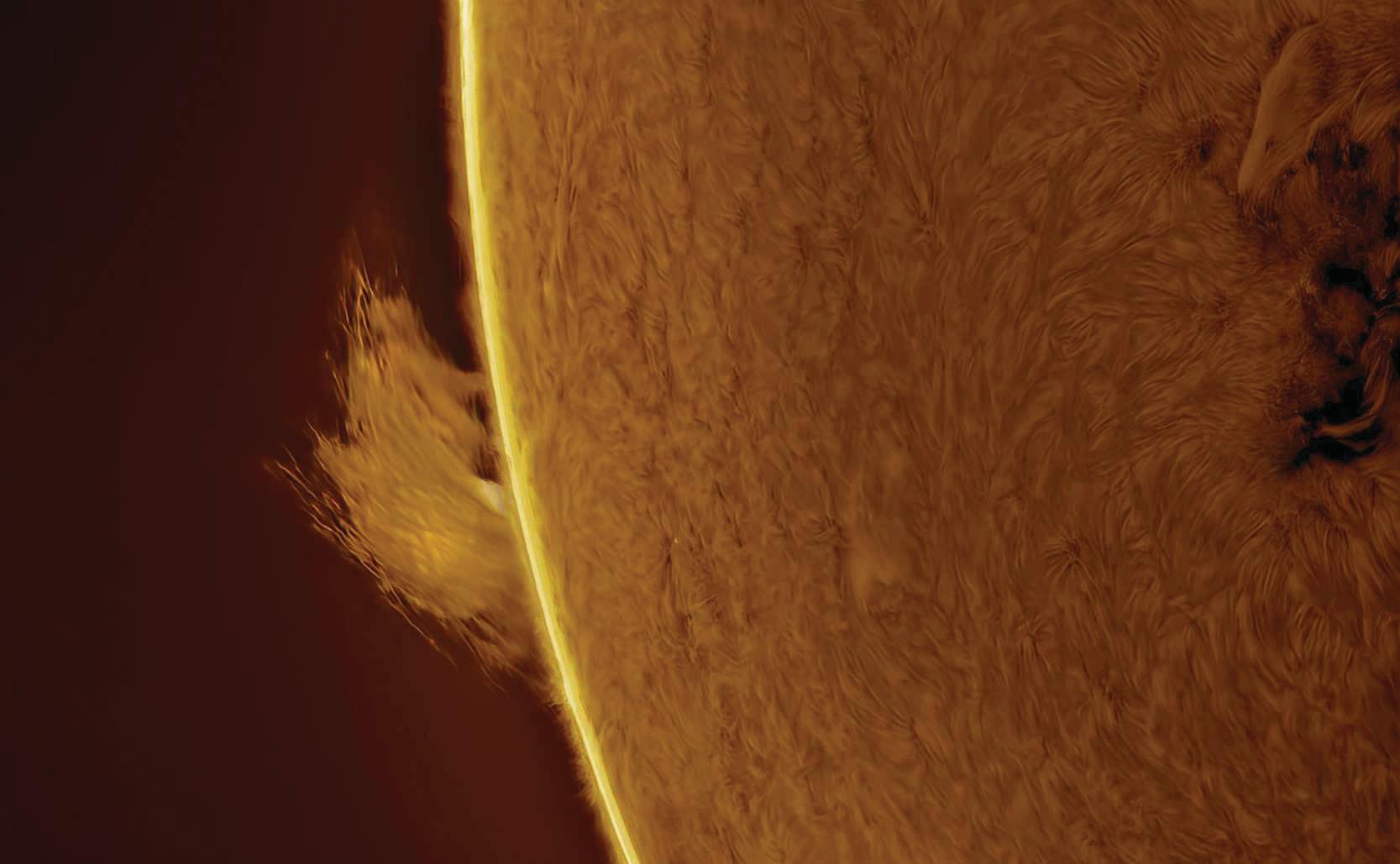ASTROPHOTOGRAPHY GALLERY
BBC Sky at Night Magazine
|October 2022
A huge solar prominence
-

Jay Bolt, Crigglestone, West Yorkshire, 18 July 2022

Jay says: "I had been capturing sunspots when I noticed a huge prominence forming on the Sun's limb. The seeing was unusually good early in the morning, allowing for very precise focusing and capturing of the plasma eruption. Solar activity has been steadily increasing over the last few years, and I am particularly pleased with the magnetic detail that processing has brought out on the chromosphere."
Equipment: Altair Hypercam 174M camera, Explore Scientific AR127mm refractor, Daystar Quark Chromosphere Ha eyepiece filter, Sky-Watcher EQ6-R mount
Exposure: 1,500 frames of SER format video, best 20% selected
Software: AutoStakkert!, Photoshop, Astra Image, Topaz DeNoise, Topaz Sharpen
Jay's top tips: "For solar imaging using a Quark Chromosphere, aim for exposures of 5-10ms for the chromosphere to 'freeze' the effects of seeing. I use gain and the histogram to achieve exposure rates of 5ms on my Altair 174M, and take 2,000 to 3,000 exposures, with the histogram peaking around 60 per cent and taking care that the top end is not clipped. For the prominences, ignore the histogram and increase exposure to bring out the detail. Typically this is around max gain and 20ms on my camera. I then shoot for 20-25 seconds. My image is a composite: the prominences are overlaid onto the chromosphere, then colourised."

Supermoon over the Needles

This story is from the October 2022 edition of BBC Sky at Night Magazine.
Subscribe to Magzter GOLD to access thousands of curated premium stories, and 10,000+ magazines and newspapers.
Already a subscriber? Sign In
MORE STORIES FROM BBC Sky at Night Magazine

BBC Sky at Night Magazine
MOONWATCH
January's top lunar feature to observe
2 mins
January 2026

BBC Sky at Night Magazine
Speed up your processing workflow
How to use Photoshop's Actions tool to drastically cut your processing time
3 mins
January 2026

BBC Sky at Night Magazine
Chasing Canada's polar lights
With solar maximum peaking and a new Moon promising dark skies, Jamie Carter travels to Churchill, Manitoba to hunt the Northern Lights - and dodge polar bears – in Canada's far north
7 mins
January 2026

BBC Sky at Night Magazine
Beyond Pluto: The search for the hidden planets
Could one – or even two - undiscovered planets lurk at the edges of our Solar System? Nicky Jenner explores how close we are to finding the elusive 'Planet 9'
6 mins
January 2026

BBC Sky at Night Magazine
Jupiter moon events
Jupiter is a magnificent planet to observe.
2 mins
January 2026

BBC Sky at Night Magazine
What samples from space have taught us
Alastair Gunn explains what scientists have learnt in the 20 years since the first unmanned mission brought materials back from alien worlds
3 mins
January 2026

BBC Sky at Night Magazine
The Milky Way as you've never seen it before
This is the largest low-frequency radio colour image of our Galaxy ever assembled
1 min
January 2026

BBC Sky at Night Magazine
Merger of ‘impossibly' massive black holes explained
Scientists discover how enormous, fast-spinning black holes can exist after all
1 mins
January 2026

BBC Sky at Night Magazine
Lunar occultation of the Pleiades
BEST TIME TO SEE: 27 January from 20:30 UT
1 min
January 2026

BBC Sky at Night Magazine
The Universe's expansion may be slowing down
New study suggests current theories of dark energy could be wrong
1 mins
January 2026
Translate
Change font size

